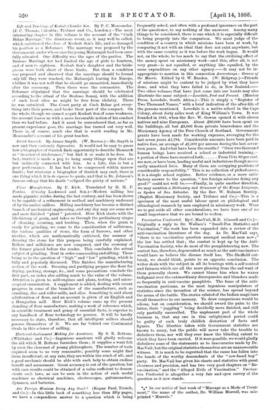Are Foreign Missions Doing Any Good (Kegan Paul, Trench, and
Co.)—In this little book of something less than fifty pages, we have a compendious answer to a question which is being frequently asked, and often with a profound ignorance on the part of the questioner, to say nothing of the answerer. Among many things to be considered, there is one which it is especially difficult to bring properly into the comparison. We must judge of the condition of a country in which missions have been at work, by comparing it not with an ideal that does not exist anywhere, but with the same country as it was before the work began. It would not, on the whole, be too much to say that the civilising effect of the money spent on missionary work—and this, after all, is not very great—is not equalled, or anything like equalled, by the same expenditure on any other agency.—It may not be in- appropriate to mention in this connection lureretanga : Groans of the Maoris. Edited by G. W. Rusden. (W. Ridgway.)—Friends of missions might be content to be judged by what they have
done, and what they have failed to do, in New Zealand.— Two other volumes that have just come into our hands may also
illustrate the same subject :--Lovedale, Past and Present. (Mission
Press, Lovedale, South Africa.)—This is simply a "Register of Two Thousand Names," with a brief indication of the after-life of the persons mentioned. Lovedale is a native school in the Cape
Colony, about forty miles west of King William's Town. It was founded in 1841, when the Rev. W. Gowan opened it with eleven
natives and nine Europeans. About £30,000 have been spent on the buildings, all but £3,000 from private benevolence and the Missionary Agency of the Free Church of Scotland. Government grants have been made for working expenses, averaging for the last seven years £2,784. Considerable amounts have been paid in native fees, an average of £1,000 per annum during the last seven- teen years. And what have been the results ? "Over two thousand human beings have received a school or industrial training,—
a portion of these have received both From 75 to 80 per cent. are now, or have been, leading useful and industrious though neces- sarily unnoticed lives. Many of them are occupying positions of considerable responsibility." This is no collection of picked cases ; it is a simple school register. Better evidence, or a more satis- factory answer to the question, " Are foreign missions doing any good ?" could not well be.—Finally, in quite another direction, we may mention a Dictionary and Grammar of the Kongo Language, as Spoken at San Salvador. By the Rev. W. Holman Bentley. (Baptist Missionary Society, and Trubner and Co.)—This is a specimen of the most useful labour spent on philological and ethnological research by men employed in missionary work. Were we to put aside all other considerations, we have here one of no small importance that we are bound to reckon.


































 Previous page
Previous page